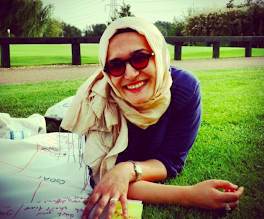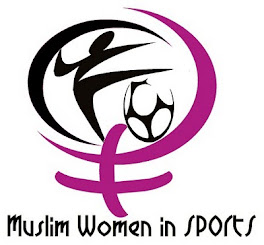Apparently, the veil becomes the most symbolic issue when it comes to "Muslim Women" even in sports news. I am not very comfortable with this situation as it makes the unveiled Muslim women less and less visible. -SSK

A Muslim basketball player is set to challenge a decision by Swiss sport authorities requiring her to either remove her headscarf or stop competing.
Sura Al-Shawk has been playing the game with a headscarf for some time at a local level but came to the attention of ProBasket, the northeastern regional basketball association, when she reached the national B-league team, STV Luzern.
The association stated that according to International Basketball Federation (Fiba) rules, headscarves cannot be worn during the game, and ruled the 19-year-old would have to choose between the game and her scarf. The federation bans all religious symbols during official games.
Failure to follow the ruling will cause the team, which Al-Shawk captains, to forfeit their matches.
Although Al-Shawk has decided not to play in the team's next match on September 19, she is angered at what she describes as an "unjust" decision and, determined to appeal, has begun talking to a Geneva lawyer.
"This decision has come too late. I've been playing wearing my scarf for almost a year and a half. Many of the players have Christian tattoos and religious symbols on their bodies and nobody objects to that," Al-Shawk, an Iraqi who recently gained her Swiss citizenship, told swissinfo.ch.
"In the past few days, a famous Swiss lawyer in Geneva contacted me and gave me specific instructions about the steps that I should follow. I also received a telephone call from a law professor at Bern University, who also works as a lawyer. He told me that a large number of lawyers were concerned about my case and that they have been following the developments."
« The right of individuals to be allowed to express their religious convictions is also protected in public life. »
Markus Sahli, Swiss Council of Religions
Raises questions
Fiba has explained that they must show "absolute political and religious neutrality" in the sport and that making an exception would open the floodgates to other requests.
"Contrary to athletics or volleyball, basketball is a contact sport, therefore the risks of injury which can result from clothing accessories are higher," spokesman Marco Beltra told the Tribune de Genève newspaper.
Al-Shawk's coach, Danijel Brankovic, has countered saying he does not understand the decision as "the Islamic headscarf does not represent any danger to the players nor hinder the game in any way".
But in an official statement STV Luzern said it "endorsed and supported" the ProBasket association in its work promoting the sport.
The case comes ahead of a controversial nationwide vote in November on an initiative to ban minarets in Switzerland.
The Swiss Council of Religions last week came out against the ban saying it infringed the right to freedom of religion. It says Al-Shawk's case raises the question of what freedom of religion means in sport.
Markus Sahli, the council's secretary, says there is no easy answer to the question and told swissinfo.ch the issue should be looked at on a case-by-case basis.
"The Council of Religions is of the opinion that the right of individuals to be allowed to express their religious convictions is also protected in public life. One can debate whether limits should already be placed on this right at the sports club level."
The Federal Commission Against Racism for its part described the basketball association's decision as "shocking in regard to the religious freedom guaranteed by the Swiss constitution".
The Iraqi Islamic Centre in Switzerland spokesman Karim Samaoui has expressed solidarity with Al-Shawk but told swissinfo.ch that Muslim communities needed to present a unified view of the issue. He urged them to use the channels of the Swiss democratic system to ensure Muslims are not subjected to "racist practices".
Jessica Dacey, swissinfo.ch (with input from Abdelhafidh Abdeleli)
Sura Al-Shawk has been playing the game with a headscarf for some time at a local level but came to the attention of ProBasket, the northeastern regional basketball association, when she reached the national B-league team, STV Luzern.
The association stated that according to International Basketball Federation (Fiba) rules, headscarves cannot be worn during the game, and ruled the 19-year-old would have to choose between the game and her scarf. The federation bans all religious symbols during official games.
Failure to follow the ruling will cause the team, which Al-Shawk captains, to forfeit their matches.
Although Al-Shawk has decided not to play in the team's next match on September 19, she is angered at what she describes as an "unjust" decision and, determined to appeal, has begun talking to a Geneva lawyer.
"This decision has come too late. I've been playing wearing my scarf for almost a year and a half. Many of the players have Christian tattoos and religious symbols on their bodies and nobody objects to that," Al-Shawk, an Iraqi who recently gained her Swiss citizenship, told swissinfo.ch.
"In the past few days, a famous Swiss lawyer in Geneva contacted me and gave me specific instructions about the steps that I should follow. I also received a telephone call from a law professor at Bern University, who also works as a lawyer. He told me that a large number of lawyers were concerned about my case and that they have been following the developments."
« The right of individuals to be allowed to express their religious convictions is also protected in public life. »
Markus Sahli, Swiss Council of Religions
Raises questions
Fiba has explained that they must show "absolute political and religious neutrality" in the sport and that making an exception would open the floodgates to other requests.
"Contrary to athletics or volleyball, basketball is a contact sport, therefore the risks of injury which can result from clothing accessories are higher," spokesman Marco Beltra told the Tribune de Genève newspaper.
Al-Shawk's coach, Danijel Brankovic, has countered saying he does not understand the decision as "the Islamic headscarf does not represent any danger to the players nor hinder the game in any way".
But in an official statement STV Luzern said it "endorsed and supported" the ProBasket association in its work promoting the sport.
The case comes ahead of a controversial nationwide vote in November on an initiative to ban minarets in Switzerland.
The Swiss Council of Religions last week came out against the ban saying it infringed the right to freedom of religion. It says Al-Shawk's case raises the question of what freedom of religion means in sport.
Markus Sahli, the council's secretary, says there is no easy answer to the question and told swissinfo.ch the issue should be looked at on a case-by-case basis.
"The Council of Religions is of the opinion that the right of individuals to be allowed to express their religious convictions is also protected in public life. One can debate whether limits should already be placed on this right at the sports club level."
The Federal Commission Against Racism for its part described the basketball association's decision as "shocking in regard to the religious freedom guaranteed by the Swiss constitution".
The Iraqi Islamic Centre in Switzerland spokesman Karim Samaoui has expressed solidarity with Al-Shawk but told swissinfo.ch that Muslim communities needed to present a unified view of the issue. He urged them to use the channels of the Swiss democratic system to ensure Muslims are not subjected to "racist practices".
Jessica Dacey, swissinfo.ch (with input from Abdelhafidh Abdeleli)
Source: http://www.swissinfo.ch/
 As a trainer eyeballs the lines, an assistant calls the students by their assigned numbers.
As a trainer eyeballs the lines, an assistant calls the students by their assigned numbers. "They find (boxing) as a way of coming out from conservativeness. They have very limited role -- poor Muslim women -- in the public sphere. So these women, these boxers, they find a way to come out and this is an outlet for them to fight poverty," Ms. Hussain says.
"They find (boxing) as a way of coming out from conservativeness. They have very limited role -- poor Muslim women -- in the public sphere. So these women, these boxers, they find a way to come out and this is an outlet for them to fight poverty," Ms. Hussain says.



